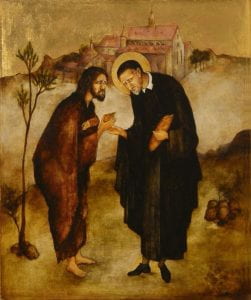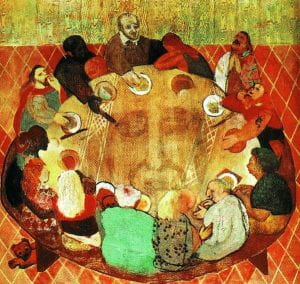
Recently, I was asked, “What is at the heart of DePaul and its mission?” After a brief pause, I responded that, for me, what best captures the heart of our mission is the concept frequently referenced here: Vincentian personalism.
In my thinking and experience, Vincentian personalism is the foundational building block for all else that we understand our Vincentian mission to be about as an institution. However, as frequently as the term is used, I believe it requires further explanation and nuance if it is to be understood in its fullness. So, bear with me. As this is the last regular Mission Monday for the academic year, I hope you will permit me a longer reflection on this topic … you do have all summer to read it!
I put Vincentian personalism at the heart of our mission because I clearly see its vital relationship to all of mission’s dimensions that so many care about. For example, I can see how the following flow from and are sustained by Vincentian personalism: effective education, caring and inclusive community, collaboration, service, social and environmental justice, systemic change, and sustainability.
On its own accord and most simply, Vincentian personalism involves recognizing and caring for the unique personhood and sacred dignity of the other. In the concrete and everyday realities of our life and work, it demands that the person before us be treated respectfully, even reverently. It is about affirming their unique personhood and vocation, understanding their story, and appreciating the way they contribute to our community and world through who they are and what they do. From our Vincentian perspective, the idea of “radical hospitality” naturally stems from a focus on Vincentian personalism, as does our understanding of inclusive community and the roots of our work around diversity and equity. We are distinguished in our Vincentian mission by creating and sustaining a culture of care for each other, first and foremost. All else grows from this foundation.
While Vincent de Paul didn’t use the term, at DePaul University we trace the concept of Vincentian personalism back to his recognition of the sacred dignity of those who were poor and abandoned and to his faith-inspired belief that they deserved to be treated honorably and with great care. As practiced by Vincent, personalism requires attending to the obstacles that prevent a person from flourishing and that prevent their God-given potential from being realized. Barriers may be systemic at the societal level, but they may also be intra- or interpersonal in nature. Therefore, Vincent’s example of personalism included attending to the spiritual and physical needs of those he sought to accompany and recognizing and affirming their unique personhood.
Theologically, from a Vincentian Catholic perspective, this commitment is rooted in modeling God’s love, the love of Jesus, and the work and movement of the Holy Spirit in our lives. God always invites us into a way of being which fosters and embodies loving and life-giving relationships and systems, and that heals and restores relationships that are broken, hurting, or causing harm.
History suggests that the concept of Vincentian personalism was first coined at DePaul by a Jewish member of our community, Howard Sulkin, founding dean of DePaul’s School of New Learning (now the School of Continuing and Professional Studies). In trying to capture the heart of the Vincentian mission through his Jewish lens and experience, Sulkin connected Vincentian personalism to an I-Thou relationship, a concept developed by renowned philosopher Martin Buber. Buber contrasted an I-Thou relationship with an I-it relationship, or one which merely objectifies others rather than honoring their distinctiveness and dignity. Interestingly, Dr. Martin Luther King, Jr., also grounded his own philosophy in personalism, apparently deriving it in a substantial way from Buber.
COVID and the work-from-home realities emerging since 2020 have made cultivating relationships in the workplace more challenging, and therefore, we have learned we must be more intentional in attending to them. Human connection and the business outcomes of effective relationships are still as valid and as needed as ever. When Vincentian personalism is remembered and reinforced at DePaul in how we go about our work and our relationships with one another, it is deeply impactful in terms of the quality of the workplace and the effectiveness of our work.
When Vincentian personalism remains primary, our relationships with one another are more likely to be loving, life-giving, and joyful. We remember that we are ultimately a community of human beings seeking to do something meaningful and good together, and that we are dependent on each other to do so. Our work involves actively and intentionally creating environments and ways of operating that affirm, support, and at times, challenge each other to be our best. With Vincentian personalism, we recognize our capacity for compassion for those who struggle, who feel on the outside, or who need additional encouragement or assistance.
Vincentian personalism most frequently plays out in small ways and in regular practices that help us to remember and reinforce the centrality of relationships in our lives. It may be practiced in how we greet one another, by thoughtfully remembering to check in with those who may be struggling, or caring enough to ask them about their needs and hopes. It may come in building regular time and space within our teams and among our colleagues to stay caught up on the goings-on of each other’s lives and work projects, or for moments of deeper personal reflection and sharing. Or perhaps, it may mean that advising or managerial sessions go beyond the surface level to also include a recognition of the other’s unique personhood and their deeper sense of vocation in relation to their academic choices or career pursuits.
Vincentian personalism also involves a commitment to look deeper, beneath statistics and headlines to the nuances of individual human lives and stories, or to look systemically to find ways of operating that serve the needs of those who are often excluded. It invites us to actively collaborate with others in meaningful ways, rather than go it alone. It might surface in holding one another accountable to agreed-upon expectations, whether for a class or job. For us, Vincentian personalism means acknowledging that everyone is a whole person living a whole life, and that their time at DePaul is just one part of that larger whole.
Here at DePaul, the heart of our mission is centered in Vincentian personalism. If you’d like to learn more about it, there are many past reflections on Vincentian personalism on our Way of Wisdom blog site. (It’s been a popular theme over the years.) For a summer reading list on the topic, you might also try entering other related terms into the search box on the site, such as relationships, community, care, or charity. (Or just explore your own themes of interest.)
Now, let’s put the question to you to ponder over the summer: What do you think is at the heart of DePaul and our Vincentian mission? [If you’d like to write a blog post detailing your answer this summer, let me know! 😊]
Reflection by: Mark Laboe, Interim Vice President, Mission and Ministry








